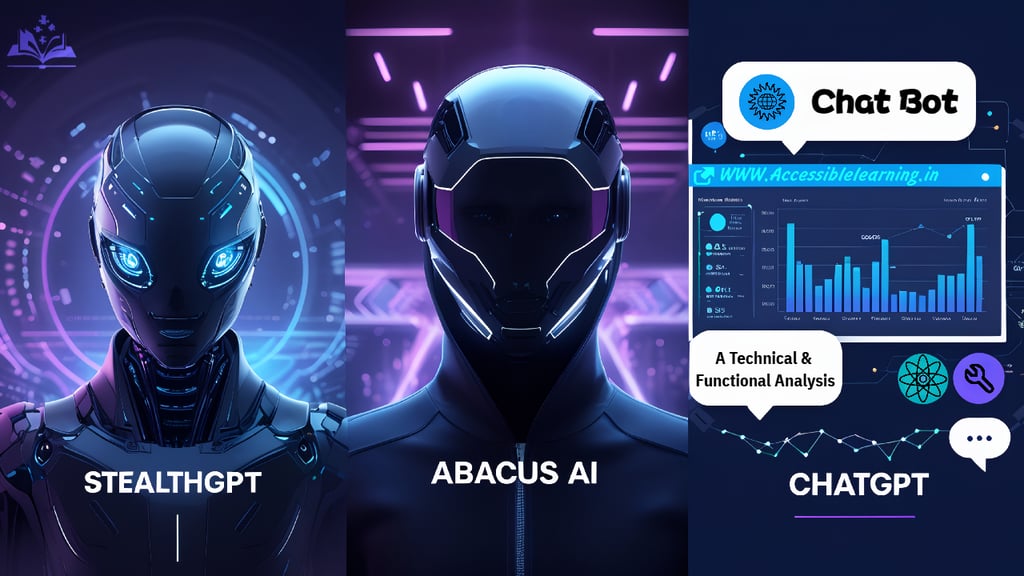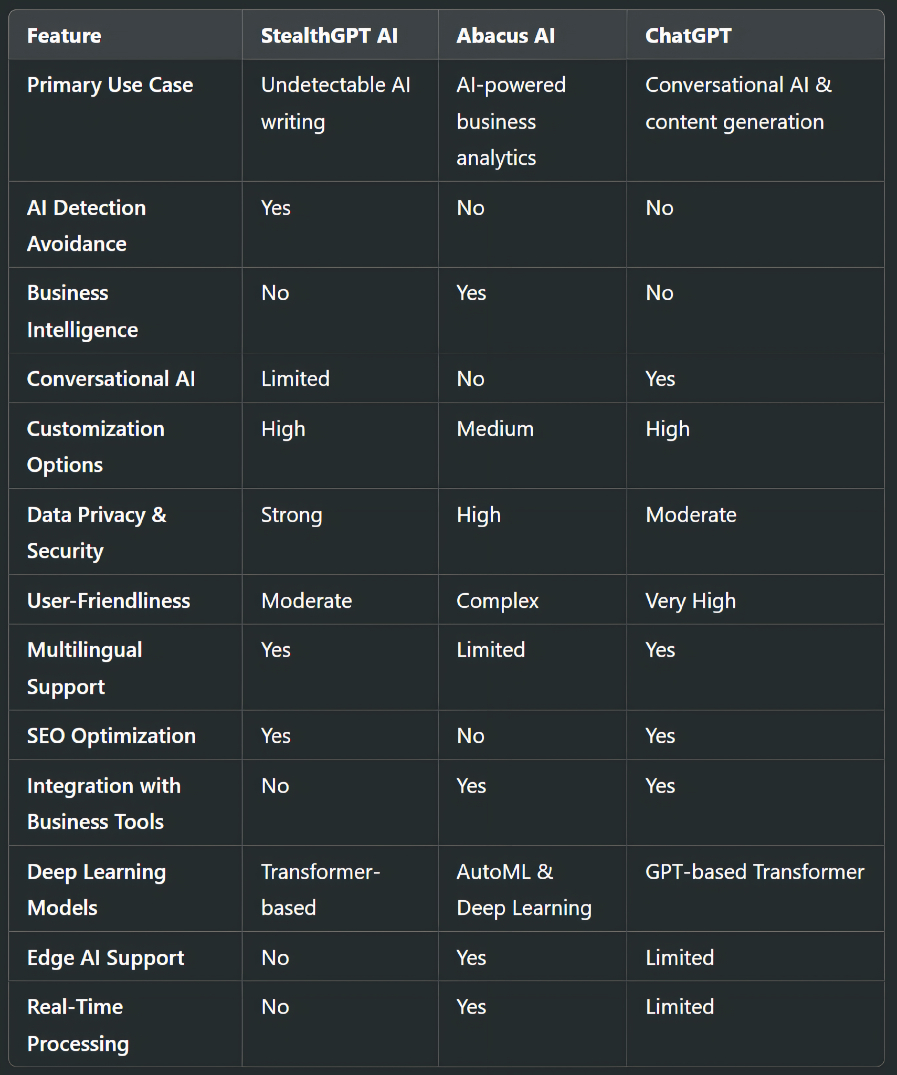
StealthGPT AI vs Abacus AI vs ChatGPT: Which AI Model Fits Your Needs?
Discover the key differences between StealthGPT AI, Abacus AI, and ChatGPT in this in-depth comparison. Learn about their features, use cases, technical strengths, and which AI model best suits your needs—whether it's undetectable AI writing, business intelligence, or conversational AI.
AI ASSISTANTAI/FUTURECOMPANY/INDUSTRYEDITOR/TOOLS
Sachin K Chaurasiya
3/26/20254 min read


Artificial intelligence (AI) is revolutionizing industries, from content creation to data analytics. Among the many AI tools available, StealthGPT AI, Abacus AI, and ChatGPT stand out in different domains. Each of these AI models serves a unique purpose, catering to specific needs in text generation, business intelligence, and automated conversations. In this article, we’ll explore their features, strengths, and ideal use cases to help you make an informed decision.
What is StealthGPT AI?
StealthGPT AI is designed primarily for undetectable AI-generated content. Its main objective is to produce text that bypasses AI detection tools, making it ideal for users who need AI-generated content that appears authentically human.
Key Features
Undetectable AI Writing: Generates text that avoids detection by AI plagiarism checkers.
Customizable Outputs: Allows users to tweak writing styles for better personalization.
Content Security: Prevents flagging by AI content moderation systems.
Privacy-Focused: Keeps user data secure and doesn’t retain generated content.
Multilingual Support: Capable of generating content in multiple languages with native-like fluency.
SEO Optimization: Helps users generate SEO-friendly content for blogs, websites, and articles.
AI Tokenization Algorithms: Uses advanced tokenization to refine output structure.
Deep Learning Frameworks: Implements transformer-based deep learning models for adaptive writing.
Strengths
✅ Undetectable AI Writing: Bypasses AI detection tools effectively.
✅ Customizable Outputs: Allows different writing styles.
✅ SEO Optimization: Generates content optimized for search engines.
✅ Privacy-Focused: Ensures user data security.
✅ Multilingual Support: Can generate content in multiple languages.
Weaknesses
❌ Limited Use Cases: Mainly focused on text generation.
❌ Not Open Source: No access to internal algorithms.
❌ Ethical Concerns: Could be misused for bypassing AI detection.
Who Should Use?
Writers who want AI-generated content to pass human detection.
Students or professionals needing paraphrased content.
Marketers are looking for stealth-generated materials.
Social media managers needing AI-driven engagement without detection.
Businesses requiring AI-assisted content that blends naturally with human writing.


What is Abacus AI?
Abacus AI is an enterprise-grade AI platform designed for business intelligence, predictive analytics, and AI automation. It primarily helps organizations manage and deploy AI-driven insights for better decision-making.
Key Features
Automated AI Model Training: Uses deep learning techniques to improve predictions.
Real-Time Analytics: Processes large datasets for accurate insights.
Custom AI Pipelines: Allows businesses to develop AI-driven workflows.
Security & Compliance: Ensures data privacy and adheres to industry regulations.
Scalability: Supports large-scale enterprise applications.
Data Science Automation: Automates various stages of the data science lifecycle, reducing human effort.
Cloud Integration: Compatible with major cloud platforms like AWS, Google Cloud, and Azure.
AutoML Capabilities: Automates hyperparameter tuning and model selection for enhanced performance.
Federated Learning: Enables privacy-preserving AI training using decentralized datasets.
Edge AI Compatibility: Supports real-time inference on edge devices, improving accessibility.
Strengths
✅ Enterprise-Grade AI: Designed for large-scale business applications.
✅ Automated AI Model Training: Reduces manual work for data scientists.
✅ Real-Time Predictive Analytics: Helps businesses make data-driven decisions.
✅ Cloud Integration: Works seamlessly with AWS, Google Cloud, and Azure.
✅ Highly Scalable: Can handle massive datasets.
Weaknesses
❌ Complex Setup: Requires technical expertise to implement.
❌ Not for General Users: Designed mainly for enterprises and data scientists.
❌ Limited Conversational Abilities: Cannot interact like a chatbot.
Who Should Use?
Businesses seeking AI-driven analytics.
Data scientists who want automated model training.
Enterprises are looking for AI-based operational improvements.
Financial institutions requiring predictive risk modeling.
Healthcare organizations are leveraging AI for patient data analysis.


What is ChatGPT?
ChatGPT, developed by OpenAI, is a conversational AI model designed to engage in human-like dialogues. It is widely used for chatbots, customer service, content creation, and personal assistance.
Key Features
Natural Language Understanding: Generates coherent and context-aware responses.
Versatile Use Cases: Suitable for writing, coding, brainstorming, and more.
User-Friendly Interface: Easy to use across different platforms.
Integration Capabilities: Works with third-party applications via API.
Creative Writing Assistance: Aids in generating stories, scripts, and marketing content.
Context Retention: Maintains context over longer conversations for a more natural experience.
Multimodal Support: Some versions support images and voice-based interactions.
Reinforcement Learning from Human Feedback (RLHF): Continuously improves through human-in-the-loop training.
GPT Architecture Enhancements: Uses transformer-based architecture optimized for contextual reasoning.
Neural Network Optimization: Implements mixed-precision training to enhance performance.
Strengths
✅ Natural Language Processing (NLP): Engages in human-like conversations.
✅ Versatile Use Cases: Suitable for writing, coding, customer support, and more.
✅ Easy to Use: User-friendly interface with quick setup.
✅ API & App Integration: Can be integrated into various platforms.
✅ Context Awareness: Maintains conversation history for better interactions.
Weaknesses
❌ AI Detection Possible: Content generated can be flagged by AI detection tools.
❌ Occasional Hallucinations: May generate incorrect or misleading responses.
❌ Privacy Concerns: Stores conversation history (unless using GPT-4 Turbo with privacy mode).
Who Should Use?
Individuals needing AI-generated content.
Businesses looking for AI chatbots or automated customer support.
Educators and students for research and learning assistance.
Developers are integrating AI-driven conversations into apps.
E-commerce platforms automate customer interactions.


Which AI Model Should You Choose?
Choose StealthGPT AI if you need AI-generated text that appears human-written and bypasses AI detection.
Choose Abacus AI if you are a business looking for AI-driven insights and automation.
Choose ChatGPT if you need a conversational AI for writing, customer support, or personal assistance.
StealthGPT AI, Abacus AI, and ChatGPT serve different but equally valuable purposes in the AI landscape. Whether you’re looking for undetectable content, business intelligence, or interactive AI conversations, choosing the right AI tool depends on your specific needs. As AI continues to evolve, these platforms will likely advance further, offering even more robust capabilities.
By understanding their strengths and applications, you can leverage the best AI solution to meet your goals efficiently. Each AI has its niche, so selecting the right one depends on whether you need stealth writing, AI analytics, or conversational AI assistance.
Subscribe To Our Newsletter
All © Copyright reserved by Accessible-Learning Hub
| Terms & Conditions
Knowledge is power. Learn with Us. 📚


